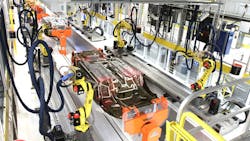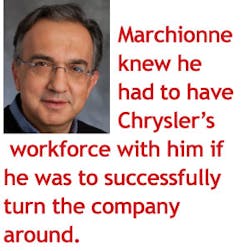In March 2009, Fiat CEO Sergio Marchionne entered into a process that would result five years later in the Italian automaker taking full ownership of Chrysler, the iconic U.S. auto giant that had filed for bankruptcy.
As Reuters Managing Editor Paul Ingrassa pointed out at a recent examination by the Brookings Institution of the auto bailouts of Chrysler and General Motors (IW 500/5) ("The Global Manufacturer"), Marchionne is the only auto CEO to have saved two companies, Fiat (IW 1000/30) a dozen years ago and then Chrysler.
What Marchionne found when he got control of Chrysler, he told a Brookings audience, was "worse than I thought," including a manufacturing environment that "had been neglected for years." From 2009 to 2013, the company spent $8 billion on retooling Chrysler's production lines.
But it wasn't only the engine and transmission lines that Chrysler invested in. Marchionne said the company also made sure to spend money on the parts of the plant that touched employees more personally -- bathrooms, lunchrooms, parking lots and reception areas. Why?
"The state of disrepair, of neglect of the work environment that these people were offered to make a high-quality product that was supposed to compete internationally with the best of the best, right?" said Marchionne. "You can't do that when you can't walk into the bathroom at one of the plants because they're just not presentable." Marchionne knew he had to have Chrysler's workforce with him if he was to successfully turn the company around. Along with retooling and good leadership decisions, he said, the success of Chrysler "was due to the unwavering commitment of a group of people who make up the blue-collar force of Chrysler."About the Author
Steve Minter
Steve Minter, Executive Editor
Focus: Leadership, Global Economy, Energy
Call: 216-931-9281
Follow on Twitter: @SgMinterIW
An award-winning editor, Executive Editor Steve Minter covers leadership, global economic and trade issues and energy, tackling subject matter ranging from CEO profiles and leadership theories to economic trends and energy policy. As well, he supervises content development for editorial products including the magazine, IndustryWeek.com, research and information products, and conferences.
Before joining the IW staff, Steve was publisher and editorial director of Penton Media’s EHS Today, where he was instrumental in the development of the Champions of Safety and America’s Safest Companies recognition programs.
Steve received his B.A. in English from Oberlin College. He is married and has two adult children.

